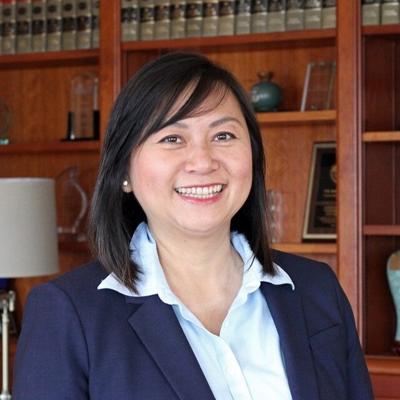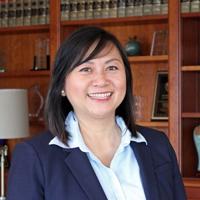
U.S. Ninth Circuit Court of Appeals Judge Jacqueline Nguyen
The state of California can force medical doctors to parrot state opinions on race and "implicit bias" when teaching courses required for doctors to keep their medical licenses, a federal appeals court has ruled.
On July 25, a three-judge panel of the U.S. Ninth Circuit Court of Appeals sided with the California Medical Board in the court fight over a constitutional challenge to the board's decision to compel the inclusion of instruction on "implicit bias" in continuing medical education (CME) courses.
In the ruling, the Ninth Circuit judges said forcing instructors to discuss the state's preferred opinions on that volatile topic in those CME classes over the instructors' objections doesn't violate the instructors' First Amendment speech rights.
Rather, the judges said allowing instructors to opt out of the state-mandated curriculum would actually violate the state of California's constitutional speech rights, as the state acts under its constitutional authority to regulate medical instruction and licensing.
"Just as California cannot compel Plaintiffs to teach subjects against their beliefs in their private capacities, Plaintiffs cannot compel California to speak against its own in its official capacity as guardian against 'quacks and pretenders and from the mistakes of incapable practitioners,'" the judges wrote in the ruling.
The opinion was authored by Ninth Circuit Judge Jacqueline Nguyen. Judges A. Wallace Tashima and Salvador Mendoza Jr. concurred in the ruling.
Nguyen is an appointee of former President Barack Obama. Tashima was appointed by former President Bill Clinton. And Mendoza was an appointee of former President Joe Biden.
The case had been lodged in Los Angeles federal court by Dr. Azadeh Khatibi, an ophthalmologist in L.A. Khatibi was joined in the lawsuit by Do No Harm, an organization whose mission is to end racial bias and other discriminatory practices based on gender, sexuality or other personal characteristics in selection of medical students and in medical education.
Khatibi and Do No Harm are represented in the action by attorneys from the Pacific Legal Foundation, a nonprofit constitutional legal advocacy group.
In a release at the time the lawsuit was filed, the PLF described Khatibi as an Iranian American immigrant whose family fled the totalitarian Islamic regime in Iran for freedom in the U.S. when Khatibi was six years old. According to the release, Khatibi "never imagined that she would escape the oppression of her childhood only to face creeping collectivism and unfree speech in America."
The lawsuit took aim at the California mandate known as AB241. Enacted in 2019, the mandate required physicians who teach CME classes to include information, drafted by the state medical board, on so-called "implicit bias" in the medical profession. The state asserted such instruction on "implicit bias" was needed to reduce so-called "healthcare disparities" based on race, gender, sexual orientation and other characteristics, which the state considers immutable.
Under California law, medical doctors are required to complete 50 CME hours every two years as a condition of renewing their state-issued medical license.
In the lawsuit, Khatibi and Do No Harm said the mandate imposes unconstitutional speech mandates on instructors, requiring them to parrot the state's preferred views on otherwise controversial political and social topics, regardles of actual evidence for their efficacy, while the instructors are attempting to educate doctors on medical and scientific topics relevant to their medical fields.
"Implicit bias is far from an established fact, yet the law demands that CME instructors presume all healthcare providers are infected with implicit bias and thus treat patients differently," the PLF said in a statement at the time the lawsuit was filed in 2023.
In court, however, that argument found little success.
In the District Court for the Central District of California, U.S. District Judge Monica Ramirez Almadani dismissed the action, finding the state, under its constitutional regulatory and licensing powers, had the authority to mandate the bias training.
Judge Almadani was appointed by former President Biden.
On appeal, that decision was upheld, as the Ninth Circuit judges determined the state had a right to compel its preferred views into medical education, because the state's "government speech" rights superseded the personal speech rights of the doctors teaching the courses and the doctors forced to complete the CME courses as a condition of licensure.
In the ruling, the appellate judges noted the state medical board controls the CMEs "from beginning to end," including holding control over who teaches the courses, what is taught in the classes, and the power to audit and reject courses the state medical board believes don't deserve accreditation.
If the state determines that doctors must learn about "implicit bias" and its effects, doctors must learn those subjects or risk losing their license, the judges noted.
Instructors who do not wish to parrot thee state views as part of the CME courses remain free to choose not to teach the courses, the judges said.
Following the ruling, Pacific Legal Foundation attorney Caleb Trotter, who represented Khatibi and Do No Harm, said they intend to file a petition with the Ninth Circuit requesting review and potential reversal of the decision from an 11-judge "en banc" appellate panel.
In the statement, Trotter said the decision was a "'dangerous misuse' of government speech," contrary to the U.S. Supreme Court's decision known as Matal v Tam. In that 2017 ruling, the Supreme Court warned against labeling otherwise protected speech as "government speech" to allow the government to stifle dissent from its favored viewpoints.
"We are disappointed in the Ninth Circuit's panel decision and are considering options for further review," Trotter said. "If continuing medical education courses in California are 'government speech' as the panel decided, then there is little to stop governments around the country from compelling continuing education instructors in any trade or profession to profess all manner of controversial state-endorsed topics."


